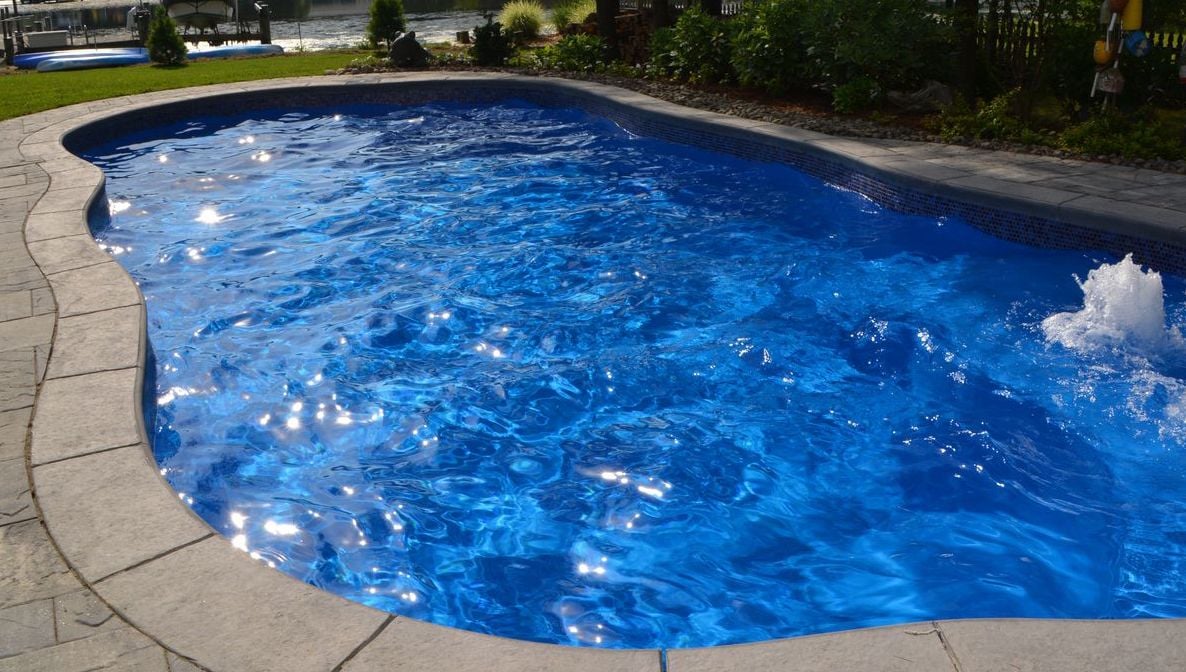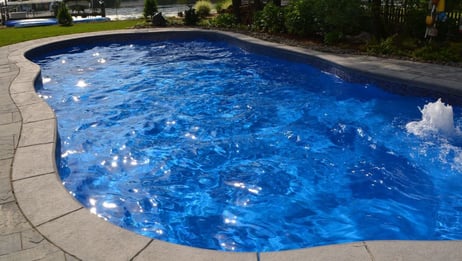
Fiberglass Pools: Pros, Cons, and Other Considerations
Fiberglass Pool Information | Fiberglass vs Concrete vs Vinyl Liner
Thinking about getting an inground pool for your backyard? You've probably been doing quite a bit of research on your options. Right now, you might be trying to narrow your options down to a fiberglass pool... or something else. By the end of this article, you should have a much better understanding of the pros and cons of fiberglass pools, and whether or not it's the best choice for your pool project, as well as what it takes to own a pool.
Nothing in life is perfect. Inground pools of any type certainly aren’t, either. We specialize in fiberglass swimming pools at River Pools, but we've been in this business long enough to understand that fiberglass isn't for everyone.
We want all pool buyers to make the best choice for their lives and homes. Over the years, we've pointed hundreds of potential customers in other directions if they’re clearly looking for something (a certain size, a specific shape, a distinct set of features, or anything else) better suited to a concrete or vinyl liner swimming pool.
At the end of the day, we want families to enjoy time together around their pool -- whether or not they choose a River Pools fiberglass pool.
Today, we’ll go over pros and cons of owning a pool whether it’s a vinyl liner, concrete or fiberglass pool. We’ll make our case for fiberglass pools, but you'll also get an honest assessment of the common disadvantages to fiberglass pools. Consider both sides, but always do your own research and consider your sources before making your final choice. This can help you decide “is owning a pool worth it?” Your pool should last as long as you own your home, so you should love whatever pool you get!
Pros and cons of owning a pool
Pros
- A Fun Way to Exercise
What are the advantages of swimming, you might ask? There are many physical and mental benefits of swimming, and swimming pools are a great way to stay fit and work out numerous parts of your body.
- A Beautiful Edition to Your Backyard Space
They’re often considered a luxury item for a reason - inground pools add a sense of elegance and beauty to any home and backyard they have found themselves in.
- Can Increase Your Home’s Value
Does a pool help or hurt home value? It depends - a lot on where you live and how desirable a pool is in your area. Oftentimes, a well-maintained inground pool can add value to one’s home. We’ll discuss this a bit more later.
Cons
- It will be an expensive addition to your home.
You know what they say, nothing in life is free. Unfortunately, getting your own pool is going to cost you, and how much you pay for installation and maintenance will depend on what type of inground pool you choose. But fear not! We have a guide to give you the have-to-knows for the different inground pools available. You can get your hands on it here.
- Will Require Time and Effort Throughout the Pool’s Lifetime
Oftentimes, people will ask “Is owning a pool a lot of work?” And we always say: well, it depends. One reason we are passionate about fiberglass is that they are the lowest maintenance inground pool type out there (we’ll get into more detail later)
There are plenty of reasons to get an inground pool, and there are also reasons not to get a pool. It’s important to assess these reasons and determine 100% that having a pool in your backyard is worth it before moving forward with the decision. This will help prevent you from going through swimming pool buyers remorse. But as we said, our expertise lies with inground fiberglass pools, so we would like to spend our time with you focusing on fiberglass.
Fiberglass Pool Pros
Let's be up front before we get started: all fiberglass pools are NOT created equal. The advantages we'll cover here apply to high-quality, well-manufactured fiberglass swimming pools.
Virtually everything in this guide has been covered in great detail throughout our comprehensive fiberglass pool buyer's guide. We highly recommend getting a copy (it's a free eBook you can download and read anywhere) so you'll have everything you might need or want on your pool-buying journey in one handy place. Just click the button below to get your copy:
Fiberglass pools are durable
One of the main benefits of fiberglass pools is their high durability -- inside and out.
Both the structure and the surface of a high-quality fiberglass pool can last a long time, provided you take good care of it.
A well-made fiberglass pool can last at least 50 years, with less maintenance required to keep it useful and enjoyable decade after decade. Speaking of maintenance...
Fiberglass pools are lower maintenance
As you've likely heard from pool owners, fiberglass pools typically require less maintenance. For example, the non-porous surface (the gelcoat) of a fiberglass pool helps resist algae growth and is designed to be compatible with common pool sanitizing chemicals. This typically means pool owners may spend less time adding and balancing chemicals or scrubbing the walls.
While regular maintenance is still necessary, fiberglass pools generally don't require acid washing, and their durable surface is less likely to need patching compared to some other pool types.
Fiberglass pools require less ongoing labor
Continuing from our last section, you’ll likely spend a lot less time and energy keeping your fiberglass pool in good shape.
Fiberglass pools don’t need to be acid washed, won't develop any wrinkles you'll need to smooth out, and they're also free from many of the other common maintenance chores you might need to tackle with other inground pool types.
If you hate pool chores, you might want to explore fiberglass pool maintenance in more detail to see what you’ll actually need to do. And if you like how-to videos, we have a video library dedicated to typical maintenance tasks.
In the end, you could always hire a pool service professional to handle the weekly maintenance tasks.
Fiberglass pools have a smooth surface
That non-porous surface --the gelcoat -- is quite smooth, and the surfaces you walk and sit on have a slip-resistant texture.
Remember scraping your knees and toes when you were a kid hanging out at your neighborhood's public concrete pool? You don’t have to worry about that with a fiberglass pool.
If you've ever gotten into the shallow end of a pool and scraped your foot on a rough surface, the gelcoat surface of a fiberglass pool could be perfect for you.
Fiberglass pools rarely need resurfacing
While we're on the subject of pool surfaces, a fiberglass pool’s gelcoat can last its entire lifetime without needing replacement or resurfacing.
Compare this to vinyl liners, which need to be replaced about every 5-9 years on average, and concrete pools, which may need complete resurfacing done every 10 years or so.
If your fiberglass pool is well-maintained, you may never need to resurface it.
However, if you ever find yourself wanting to resurface your fiberglass pool, it can be done with a product like ecoFINISH -- a durable polyethylene polymer coating with a wide range of colors and multiple textures. (Read our ecoFINISH review here.)
Fiberglass pools are algae-resistant
Algae is ugly. What's worse is that it forces you to use more chemicals to get rid of it, and algae often forces you to run your pump and filter more often as well.
A fiberglass pool's non-porous surface helps prevent algae from sticking to its walls, which makes algae much less likely to become a problem in your pool -- provided you maintain it regularly!
Concrete Pools allow for more algae growth due to porosity of the surface. That’s why you have to scrub your pool surface with a brush regularly. While vinyl liner pools with algae will see it build up at the seams where sections of the vinyl material are welded together during manufacturing.
Fiberglass pools have lower lifetime costs
All that acid washing, resurfacing, repairing, and liner replacing costs money over the life of your pool ownership.
Because a fiberglass pool doesn't need this sort of work, and because your ongoing maintenance costs will be lower overall, you can often save thousands of dollars over the years over what you might have spent to upkeep other inground pool types.
-1.png?width=551&height=468&name=unnamed%20(2)-1.png)
Fiberglass pools have faster installation times
Want your concrete pool fully built, in the ground, and full of water in less than a week?
It ain't happening. Unfortunately for concrete (gunite) pool fanatics, concrete pools are built from scratch, with long periods of time for the concrete to cure, thus leading to longer installation times.
However, putting in a pool of the fiberglass variety tends to yield faster installations. The fiberglass pool shell -- which is basically the entire structure you'll swim and lounge in once it's in the ground -- arrives at your home completely manufactured and ready to be installed.
Once it’s in the ground and your installer begins backfilling the pool, they must also fill the pool with water to equalize the pressure on both sides of the shell. This mandatory backfill-and-fill process results in a much faster installation process overall.
In most cases, a pool shell can be in ground and full of water within 5 days, while the entire project could be wrapped up, with patio installation and everything else you've asked for beyond the pool itself, within two to six weeks on average. Ultimately it depends on how complex the project design is, and the logistical planning required.
On average, concrete pools typically take three to six months for full installation.
Vinyl liner pools often take six to eight weeks on average.
If you'd like to save your spot for a pool project in the near future, request a quote below and we'll help connect you with an independent installer serving your area. Just click the button below.
Fiberglass Pools are Compatible with Several Sanitizing Systems
Fiberglass pools work well with salt chlorine generators, traditional chlorine systems, and UV/ozone sanitizers, giving you flexibility in how you keep your pool clean.
- Salt Chlorine Generators – A great match for fiberglass pools, as the smooth, non-porous surface resists salt damage. Unlike concrete or vinyl pools, fiberglass won’t corrode or erode from salt exposure.
- Traditional Chlorine Systems – An affordable and reliable option. Fiberglass pools require fewer chemicals than other pool types since algae struggles to grow on the slick surface.
- UV and Ozone Systems – These can reduce chlorine use while keeping the water sanitized. They work best as supplements to a chlorine or salt system.
We recommend you speak with the manufacturer you're considering for any recommendations they have for maintaining pool water balance and chemistry. Our recommendations can be found here.
No matter which option you choose, fiberglass pools make maintenance easier by resisting algae and minimizing chemical demand.
Fiberglass pools are attractive
This might be more of a subjective opinion than an unarguable fact... but we invite you to browse our pool gallery, so you can see for yourself just how beautiful a high-quality fiberglass pool can really be.
Fiberglass pools (at least those made here at River Pools) come with multiple surface color options, and your installer can customize it with your waterline tile of choice.
Fiberglass pools also have sleek, smooth surface finishes and can utilize a range of attractive coping options.
Fiberglass pools have built-in features
Want a tanning ledge, bench seating, or a built-in spa?
That may cost extra when you buy other inground pool types.
Fiberglass pools include these features for no additional cost -- if you choose a model that has them as part of their design. This means that you can get a pool with all the hottest features without worrying about racking up unexpected additional costs.
(Read next: 7 Pool Extras That Won't Break the Budget)
Fiberglass pools are manufactured in a controlled environment
Do you live in a "weird" or just plain unpredictable climate? Are you worried about how the weather might impact the construction of your pool? Bad weather can have a real and generally unwelcome affect on pool construction depending on the type of pool.
The largest part of a fiberglass pool -- the pool shell -- is manufactured off-site in a controlled environment, so even the worst weather won’t affect the final quality of the swimming pool installed in your backyard.
We also allow our gelcoats to cure in a secure space at controlled temperature and humidity levels to achieve optimal strength and durability.
This process ensures every pool shell, for every model we sell, comes out of our warehouse with the same superior quality, whether it's going down the street or all the way to Utah.
Fiberglass pools can increase the resale value of your home
Not all swimming pools increase the value of your home. Fiberglass pools often do.
A pool considered to be more permanent often can contribute to the value of your home.
A fiberglass pool can increase your home’s value by around 5%. This always varies by home, region, and other factors, though.
Fiberglass pools can be installed above ground or semi-inground
Can’t decide if you want your pool fully inground, semi-inground, or completely above ground with a wrap-around deck?
A fiberglass pool can be installed practically anywhere and any way you want, even on the roof. If this is an appealing option for you, be sure to speak with the installer you're considering. Not all manufacturing facilities have the ability or capacity to add the required fortification to the shell, and your installer may not either
Note: At this time River Pools does not offer shell modification services for above ground fiberglass pool installations.

Fiberglass pools are more environmentally friendly
Fiberglass pools can save you lots of money in chemicals by helping you avoid the lifelong battle with algae that can plague other types of pools.
A nice byproduct of this benefit is it's easier on the environment, too.
If and when you decide to remove or replace your pool, the old fiberglass in your pool shell can even be recycled.
Fiberglass pools save money
Fiberglass is pretty durable, which helps you save a lot on long-term maintenance costs.
And because you'll likely never have to drain your pool to acid wash the surface, and you'd have no liner to replace, you won’t have to spend money to refill your pool either.
Fiberglass pools are flexible and strong
The earth doesn’t just move when there’s an earthquake.
In fact, it’s perfectly normal for the earth to shift subtly over time, which is often the reason structural and/or cosmetic cracks can appear in concrete pools.
Fiberglass is strong, but it's also flexible enough to withstand the earth's movement without any major damage to the pool shell.
Live near the Wasatch Fault in Salt Lake City? A fiberglass pool could be a very good option for you!
Fiberglass Pool Cons
As we said, fiberglass pools aren’t perfect, and even if they were, they wouldn't be perfect for everyone.
Let's be up front about some common drawbacks fiberglass pools can present to pool buyers. We think you should know as much as possible about your pool before you buy it.
Fiberglass pool designs can be limited
There are a wide range of fiberglass pool designs to choose from. However, you, as a customer, won’t get to take part in the process of designing your pool.
You can still choose the surface color and add-ons you want with your fiberglass pool shell, but you can't create your own custom shape, or have your pool built to a specific size and/or depth.
Let's say you want our L36 pool, but you'd rather not have a tanning ledge, and you want it to be a foot deeper. Unfortunately, we can't do this without building a whole new pattern and mold.
A lot of work goes into building a mold.
Each mold can produce hundreds of pools over its lifetime. It would be costlier for both the fiberglass pool manufacturer and the customer if a brand new pattern and mold were to be built for every person who wants to modify their pool design.
Fiberglass pools can’t be wider than 16 feet
Have you ever driven behind one of those trucks with an "oversize load" sign? This means whatever's hitched to the truck (i.e., a swimming pool, mobile home, etc.) is more than 8.5 feet wide. Shipping containers are built to stay within this limit, but many truck loads are nonetheless too big to fit in a container.
To get our oversize-load pools from our manufacturing plant to your home, we have to get permits and follow certain transportation rules.
Anything that exceeds 16 feet in width is classified as a superload.
Superloads are much harder to transport. They face significantly more regulations than oversize loads, require a more extensive government approval process, and may possibly even need a police escort. This is the main reason fiberglass pools are typically no more than 16 feet wide.
However, staying within these mandated width limitations allows us to ship our pools all over the country without much hassle.
Fiberglass pools are harder for DIY-ers
Fiberglass pools can be installed DIY, but we don’t recommend it since the process can be more challenging than it is for vinyl liner pools (despite the fact that fiberglass pools essentially come in one piece).
For starters, it's often tricky to get the pool level (and it’s important!).
Pouring coping around a fiberglass pool can also be a challenge. We always recommend you at least consult with someone who has experience building fiberglass pools, if you really want to DIY the installation. In most cases, the money you might save by doing it yourself simply isn't worth the risk of an improper or incomplete fiberglass pool installation.
DISCLAIMER: While some fiberglass pool manufacturers do sell direct to homeowners, River Pools fiberglass pools are not available to purchase for DIY projects.
Fiberglass pools usually cost more than vinyl liner pools
On average, fiberglass pools generally cost between $85,000 to $135,000, and can easily cost more for a turnkey professional installation. A professionally installed vinyl liner pool, on the other hand, typically costs between $65,000 and $125,000 on average, with turnkey packages potentially running more.
If your main goal is to have an inground pool for as little money as possible, vinyl liners might be a more attractive option. However, it’s important to keep in mind the lower lifetime costs of fiberglass pools, and also their potential to increase the resale value of your home.

Want to see about how much that cost will be with all your favorite pool accessories?
Use our Design and Price Tool to walk through your options and approximate price!
Repairs on some colored finishes don’t always match
If your gelcoat needs a small repair for any reason, the repaired area may not exactly match the color on the rest of your pool shell.
Fiberglass pools can fade slightly over time, and the repaired area might stand out a bit more than you might like it to be. Under normal conditions, a fiberglass pool's gelcoat may fade very slightly and at a very slow rate, but a fresh gelcoat patch can be obvious, depending on its placement (and other factors).
*Pro tip: Be certain to follow the recommended chemistry guidance provided by the manufacturer of your fiberglass pool to maintain its surface finish.
You can’t resurface the entire pool with gelcoat
You might be able to make small gelcoat repairs on your fiberglass pool, but it's really impractical to resurface the entire pool with a fresh gelcoat.
Gelcoat provides a durable and attractive finish, but to cure properly, it needs to sit, or cure in a controlled environment.
Since your pool is already in the ground (and is probably) outdoors, this is not an ideal option.
Fiberglass pools can get osmotic blisters
Osmotic blisters were once a problem for many fiberglass pool manufacturers. We’ve found a way to beat this... but what is an osmotic blister, anyway?
Osmotic blisters are usually described as small bumps or bubbles in the surface of a pool shell.
They form when water molecules get trapped behind the gelcoat layer, causing a chemical reaction with resin in the pool shell. Osmotic blisters won't compromise the structure of a fiberglass pool, but they do degrade its finish and can be rather unattractive.

Deciding on the right type of inground pool for your backyard involves weighing various pros and cons. Ultimately, we want you to make the best decision for your home, and the best pool for you is the one that fits your lifestyle and backyard vision.
Have questions about fiberglass pools? Ask us anything that's on your mind (preferably about fiberglass pools) at fun@riverpoolsandspas.com, and we'll answer as soon as we can.
At River Pools, we manufacture world-class fiberglass pools for customers across North America. After learning about the benefits of having a pool at home, we encourage you to check out our learning center. Feel free to also take a look at our catalog of models to see what we have to offer, and try out our pool pricing calculator for an inground pool cost estimate. Also, be sure to download your free ebook for more information on how to get started on your journey to a fiberglass pool.
Up Next:
Fiberglass Swimming Pools 101: Manufacturing, Cost, and More
What’s the Best Small Fiberglass Pool for Your Needs? Costs, Sizes, Features
Should You Buy a Fiberglass Pool? (Infographic)
Editor's note: This article was originally written by Marcus Sheridan and was updated on December 18, 2024, with current information. River Pools is a brand of inground fiberglass pools produced in a manufacturing facility in Fortville, IN. While our expertise is in manufacturing fiberglass pools, we have access to a network of installers with expertise relating to project design, installation, and pool service. We often tap into this knowledge base and share information freely with homeowners, just like you, considering installing a swimming pool in your backyard.









